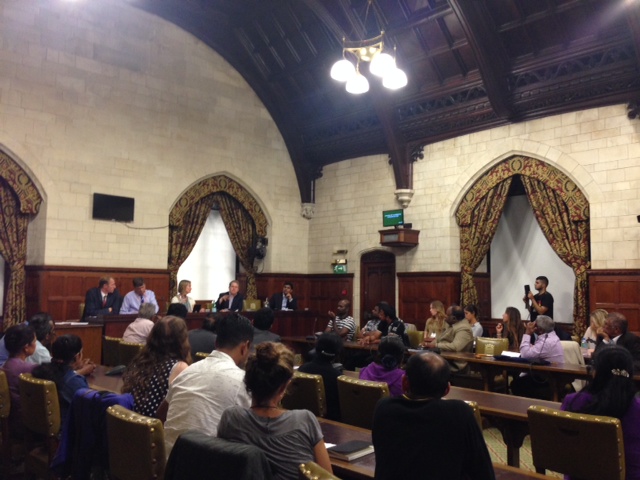 |
Parliamentarians and campaigners held a discussion at the Houses of Parliament in Britain on Tuesday, where campaigners highlighted Sri Lanka's repressive Prevention of Terrorism Act (PTA), which has been used to arbitrarily arrest and detain individuals for years.
Organised by the Tamil Information Centre, the event was chaired by British Parliamentarian Paul Burlow. Speakers included Member of Parliament Edward Davey, Yolanda Foster from the South Asia desk at Amnesty International, Dr Andy Keef, the Clinical Directer at Freedom From Torture, Alan Keenan Senior Analyst and Sri Lanka Project Director at the International Crisis Group and Kulasegaram Geetharthanan, a human rights lawyer.
Entitled 'National Security Law in Sri Lanka: Impunity and Accountability', Edward Davey opened the event stating the Sri Lanka's Prevention of Terrorism Act has been used “as a weapon of oppression”, slamming it as a practise that “cannot meet any standard of justice or human rights”.
Foster highlighted the cases of exiled journalist J.S. Tissainayagam and disappearances campaigner Jeyakumari who was arrested earlier this year under the PTA, calling it a “repressive piece of security legislation which has been used to arbitrarily arrest individuals” adding it “sends a chilling message to dissidents”. She went on to describe one of the “Kafka-esque” aspects of the law, the ability of the Sri Lankan security forces to hold individuals under custody for years without charge.
Dr Andy Keef detailed cases of torture from Sri Lanka that his organisation noting that the use of violence against Tamils was “systematic”. He went on to add that the practice of branding in particular not only “suggests acting with impunity”, but seems to have the implicit aim of “sending message to community”. Those at particular risk were Tamil asylum seekers who were being deported said Keef, noting victims have been “specifically being targeted on that account”.
Speaking on the PTA, Alan Keenan noted that during the armed conflict, such laws “had the backing of the majority of Sinhalese”, who were also “willing to accept the atrocities on the mass scale that were used to defeat the LTTE.” He added that since of end of the armed conflict, the rule of law on the island has bee further undermined with militarisation across the Tamil majority North-East and politicisation of the police.
Noting that the PTA is “alongside Buddhism in holding a special place” by the state, Keenan added,
“I don't see any government in Sri Lanka, whichever party or coalition, opposing the PTA.”
The final speaker, Kulasegaram Geetharthanan, a lawyer who has worked with Tamil victims, introduced to the audience four individuals who had suffered torture after being detained under the PTA.
He concluded by adding that Sri Lanka was using the threat of the LTTE as an excuse to arrest Tamils and that the government “is suppressing an ethnic community”.
We need your support
Sri Lanka is one of the most dangerous places in the world to be a journalist. Tamil journalists are particularly at threat, with at least 41 media workers known to have been killed by the Sri Lankan state or its paramilitaries during and after the armed conflict.
Despite the risks, our team on the ground remain committed to providing detailed and accurate reporting of developments in the Tamil homeland, across the island and around the world, as well as providing expert analysis and insight from the Tamil point of view
We need your support in keeping our journalism going. Support our work today.
For more ways to donate visit https://donate.tamilguardian.com.

